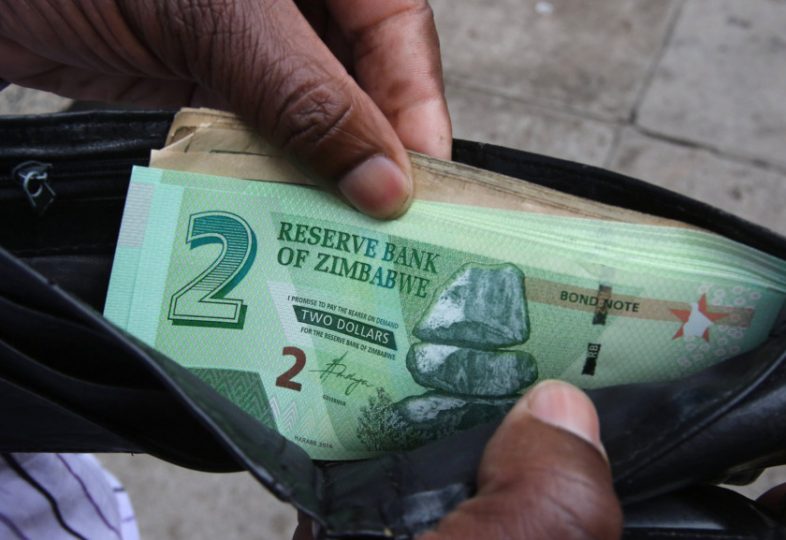Source: Introduction of Zimdollar to sink economy, say analysts – The Zimbabwe Independent June 28, 2019
Losing value … Bond notes
THE decision by government this week to abolish the multi-currency regime and re-introduce the Zimbabwean dollar as the sole legal tender could be catastrophic as the local currency’s value may tumble against major currencies, plunging the country into hyperinflation.
BY TINASHE KAIRIZA
While some captains of industry and analysts welcomed the move, others were sceptical and critical.
The Zimdollar, which was initially abandoned in 2009 after being ravaged by severe hyperinflation, this week became the country’s sole currency through Statutory Instrument (SI) 142 of 2019, known as the Reserve Bank of Zimbabwe RBZ (Legal Tender) Regulations.
In 2016, government introduced the bond currency to the basket of currencies, a fiat currency which was ostensibly meant to incentivise exporting firms.
“These regulations may be cited as the Reserve Bank of Zimbabwe (RBZ) Legal Tender Regulations 2019. Subject to Section 3, with effect from 24th June 2019, the British pound, United States dollar, South African rand, Botswana pula and any other foreign currency whatsoever shall no longer be legal tender alongside the Zimbabwe dollar in any transactions in Zimbabwe,” part of the SI said.
“Accordingly, the Zimbabwean dollar shall, with effect from the 24 June, 2019, but subject to Section 3, be the sole legal tender in Zimbabwe in all transactions.”
The rationale to abandon the multi-currency system, which brought relative stability on the market when it was introduced in 2009, as explained by Finance minister Mthuli Ncube this week, is to restore the central bank’s monetary authority, thereby containing spiralling commodity prices and inflation.
“What we are trying to do is restore full monetary policy where the central bank can conduct monetary policy using the array of tools that are necessary for managing monetary policy such as interest rates, use of a monetary policy committee to govern things like targeting money balances or even targeting inflation,” Ncube said.
“Basically, the multi-currency regime, which had by the way become a mono-currency in favour of the US dollar, was favouring those with access to US dollars; those with access to US dollars were facing no change in inflation at all for the last three years.”
However, the basis for adopting a basket of currencies a decade ago was supported by the need to stabilise Zimbabwe’s fragile economy in the absence of macro-economic fundamentals which resulted in the decimation of the local dollar, amid spiralling inflation which peaked to 89,7 sextillion percent on November 14, 2008.
Now, a decade later Zimbabwe — still deep in the throes of an intractable economic crisis — is reeling from unstable macro-economic fundamentals not conducive for the return of the local dollar. The local unit, a combination of electronic balances, bond coins and notes already in circulation, has failed to hold its own against major currencies, particularly the ever firming United States dollar.
Official figures show that inflation has risen to 97,8%, though renowned US economist Steve Hanke forecasts it to be hovering at more than 300%. Ironically, Treasury projects inflation to recede below 14% by year-end, tamed as it says, by the range of austerity measures currently being implemented.
With Zimbabwe’s agriculture sector, which used to be the mainstay of the economy, ruined by former president Robert Mugabe’s chaotic land reform programme of 2000, experts say the southern African country’s decision to abandon the multi-currency system, while upholding the local dollar as the sole legal tender could lead to an all too familiar path of hyperinflation.
Ditching the basket of currencies, analysts say, will exert inflationary pressures on the local currency, unless backed by foreign currency, gold reserves and exports.
In February, government liberalised the exchange rate, resulting in the RTGS dollar tumbling in value against the US dollar and other currencies. It is now pegged at 6,3 to the US dollar on the interbank market, while on the parallel market it has soared to 13.
Critics of the return of the Zimbabwean dollar, which is now the monetary unit effectively in circulation, say that it is imperative to ensure macro-economic stability and restore public confidence before the country can start trading with its local currency. They say the real value of a currency lies in the public confidence besides its intrinsic and market value.
But, with memories of Zimbabwe’s hyperinflation era still fresh in their memories, confidence appears to have waned as the local unit continues to tumble against currencies of choice, necessitating government intervention.
Coupled with that, Zimbabwe is also struggling to extinguish an estimated US$20 billion debt stock, a situation which has restricted the country from unlocking fresh lines of credit perceived to be key towards mending the sbattered economy.Bindura University commerce lecturer Felix Chari said in the absence of structural economic reforms, Treasury’s decision to abandon the multi-currency regime would stoke inflationary pressures, and render the local unit worthless.
“It was premature to reintroduce the local currency in the absence of sound macro-economic fundamentals required to stabilise the economy. The Zimbabwean dollar is vulnerable to inflation due to low levels of productivity and exports. Inflation will continue to rise as the Zimbabwean dollar devalues,” Chari contends.
Former finance minister Tendai Biti, who served in the inclusive government that saw Zimbabwe adopting dollarisation as an official currency policy, said the scrapping of the multi-currency regime would spark civil unrest, with retail shops running dry and the local unit depreciating.
“It is insanity, it is total madness. You cannot introduce a new currency when the macro-economic fundamentals are not there. We have a crisis of confidence, a crisis of legitimacy,” Biti said.
“You are going to see a massive shortage of goods in the supermarkets. You are going to see disinvestment in the country. There will be massive externalisation. You will see massive civil unrest. It is a major security threat.”
However, other analysts say the Zimdollar’s return was necessary even in these conditions.
Newer Post
Local banks dump Paynet 
COMMENTS